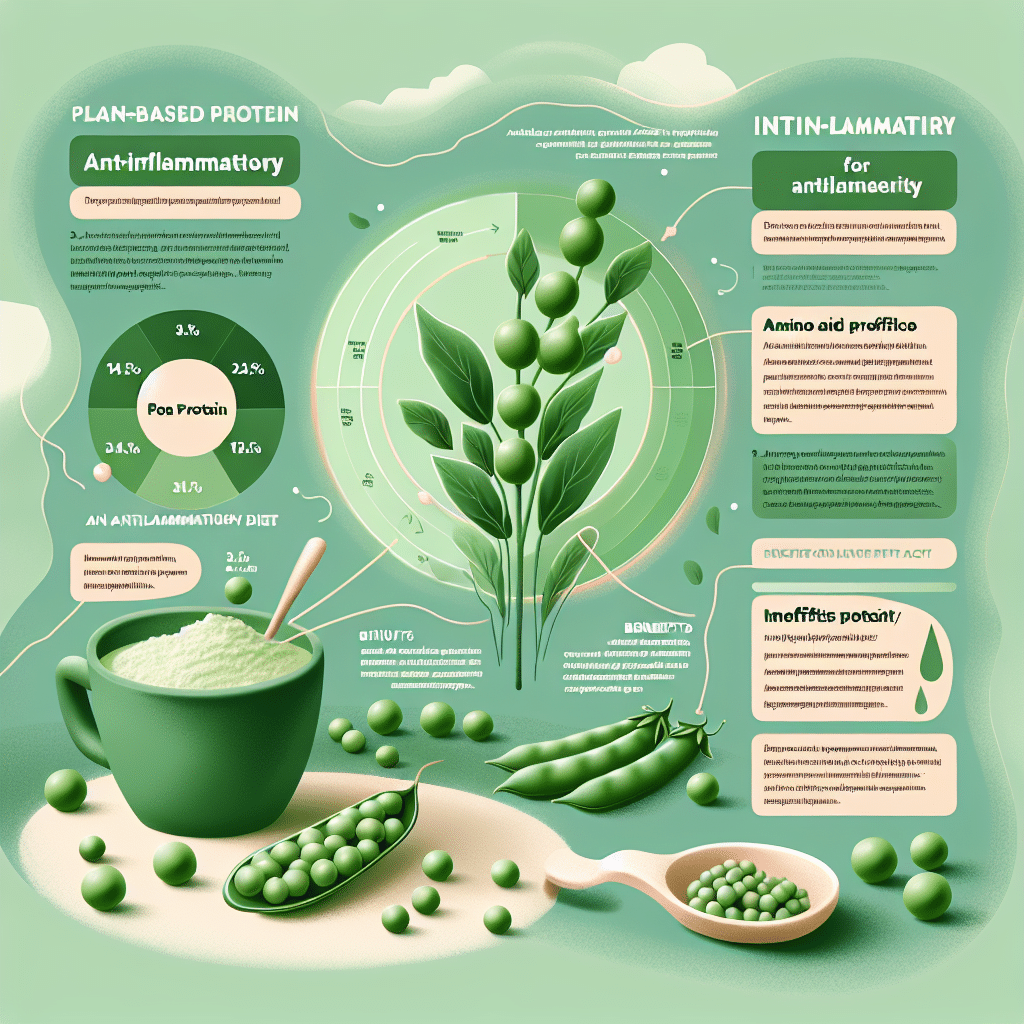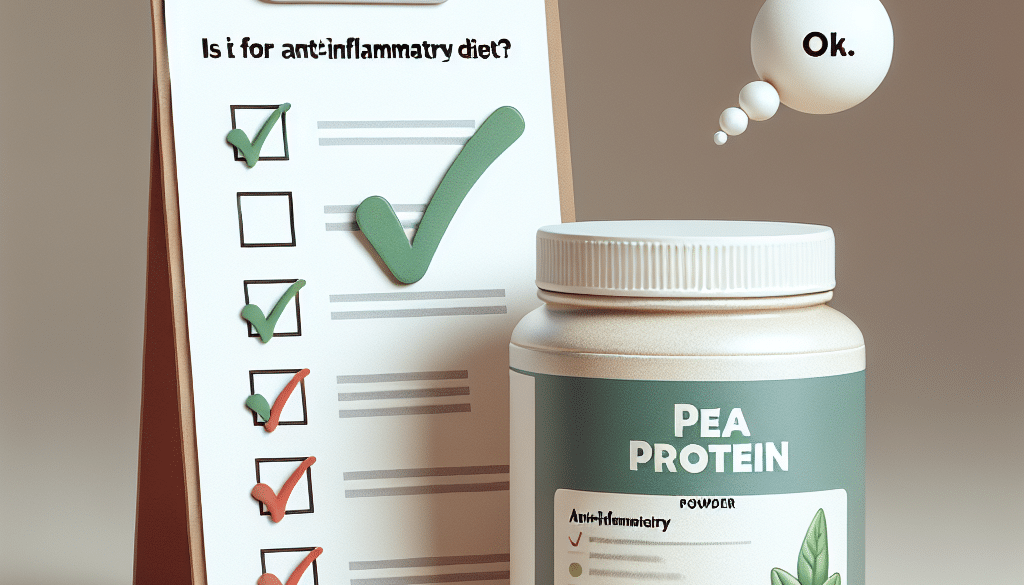Is Pea Protein Ok For Anti Inflammatory Diet?
-
Table of Contents
- Pea Protein and Anti-Inflammatory Diets: A Comprehensive Analysis
- Understanding Anti-Inflammatory Diets
- The Nutritional Profile of Pea Protein
- Pea Protein’s Anti-Inflammatory Properties
- Case Studies and Research on Pea Protein and Inflammation
- Comparing Pea Protein to Other Protein Sources
- Incorporating Pea Protein into an Anti-Inflammatory Diet
- Potential Concerns and Considerations
- Conclusion: The Role of Pea Protein in Anti-Inflammatory Diets
- Discover ETprotein’s Premium Pea Protein Products
Pea Protein and Anti-Inflammatory Diets: A Comprehensive Analysis

In recent years, the popularity of plant-based diets has surged, with many individuals seeking alternatives to animal-derived proteins. Among the various plant proteins available, pea protein has emerged as a favorite due to its nutritional profile and sustainability. However, for those following an anti-inflammatory diet, the question arises: Is pea protein a suitable option? This article delves into the properties of pea protein and its compatibility with anti-inflammatory dietary practices.
Understanding Anti-Inflammatory Diets
Anti-inflammatory diets are designed to reduce chronic inflammation in the body, which is linked to numerous health conditions, including heart disease, diabetes, and autoimmune disorders. Such diets typically emphasize the consumption of whole foods, rich in antioxidants, and omega-3 fatty acids, while minimizing the intake of processed foods, sugars, and certain saturated fats.
The Nutritional Profile of Pea Protein
Pea protein is derived from yellow split peas and is a high-quality source of protein that is rich in essential amino acids. It is particularly high in branched-chain amino acids (BCAAs), which are crucial for muscle growth and repair. Additionally, pea protein is hypoallergenic, making it a suitable option for individuals with allergies to dairy or soy.
- Rich in essential amino acids
- High in BCAAs
- Hypoallergenic
Pea Protein’s Anti-Inflammatory Properties
Research has indicated that pea protein may possess anti-inflammatory properties. This is partly due to its content of arginine, an amino acid that plays a role in immune function and has been shown to have anti-inflammatory effects. Moreover, pea protein does not contain substances that are commonly associated with inflammation, such as the saturated fats found in some animal proteins.
- Contains arginine with potential anti-inflammatory effects
- Lacks pro-inflammatory saturated fats
Case Studies and Research on Pea Protein and Inflammation
Several studies have explored the impact of pea protein on inflammation. For instance, a study published in the “Journal of Inflammation” found that pea protein hydrolysate could reduce inflammation in rats. While more research is needed, particularly in humans, these findings are promising for those considering pea protein as part of an anti-inflammatory diet.
Comparing Pea Protein to Other Protein Sources
When compared to other plant-based proteins, such as soy or wheat, pea protein stands out due to its balanced amino acid profile and digestibility. It is also more environmentally friendly than animal-based proteins, as it requires less water and land to produce.
- Balanced amino acid profile
- High digestibility
- Environmentally sustainable
Incorporating Pea Protein into an Anti-Inflammatory Diet
Pea protein can be easily incorporated into an anti-inflammatory diet through various forms, such as powders, bars, or meat substitutes. It can be added to smoothies, baked goods, or savory dishes to boost protein intake without contributing to inflammation.
- Available in powders, bars, and meat substitutes
- Can be added to a variety of recipes
Potential Concerns and Considerations
While pea protein is generally considered safe and beneficial for most individuals, it is essential to consume it as part of a balanced diet. Over-reliance on any single protein source can lead to nutritional imbalances. Additionally, those with specific health conditions should consult with a healthcare provider before making significant dietary changes.
- Should be part of a balanced diet
- Consultation with healthcare provider recommended for those with health conditions
Conclusion: The Role of Pea Protein in Anti-Inflammatory Diets
In conclusion, pea protein appears to be a suitable option for those following an anti-inflammatory diet. Its nutritional profile, hypoallergenic nature, and potential anti-inflammatory properties make it an excellent choice for individuals looking to reduce inflammation through their dietary choices. As with any dietary change, it is important to ensure variety and balance to meet all nutritional needs.
Discover ETprotein’s Premium Pea Protein Products
If you’re looking to incorporate high-quality pea protein into your anti-inflammatory diet, ETprotein offers a range of organic and non-GMO pea protein products. Their pea protein is characterized by a neutral taste and is free from common allergens, making it an ideal addition to your health-focused lifestyle. Explore ETprotein’s offerings to find the perfect pea protein solution for your dietary needs.
About ETprotein:
ETprotein, a reputable protein and L-(+)-Ergothioneine (EGT) Chinese factory manufacturer and supplier, is renowned for producing, stocking, exporting, and delivering the highest quality organic bulk vegan proteins and L-(+)-Ergothioneine. They include Organic rice protein, clear rice protein, pea protein, clear pea protein, watermelon seed protein, pumpkin seed protein, sunflower seed protein, mung bean protein, peanut protein, and L-(+)-Ergothioneine EGT Pharmaceutical grade, L-(+)-Ergothioneine EGT food grade, L-(+)-Ergothioneine EGT cosmetic grade, L-(+)-Ergothioneine EGT reference grade and L-(+)-Ergothioneine EGT standard. Their offerings, characterized by a neutral taste, non-GMO, allergen-free attributes, with L-(+)-Ergothioneine purity over 98%, 99%, cater to a diverse range of industries. They serve nutraceutical, pharmaceutical, cosmeceutical, veterinary, as well as food and beverage finished product distributors, traders, and manufacturers across Europe, USA, Canada, Australia, Thailand, Japan, Korea, Brazil, and Chile, among others.
ETprotein specialization includes exporting and delivering tailor-made protein powder and finished nutritional supplements. Their extensive product range covers sectors like Food and Beverage, Sports Nutrition, Weight Management, Dietary Supplements, Health and Wellness Products, and Infant Formula, ensuring comprehensive solutions to meet all your protein needs.
As a trusted company by leading global food and beverage brands and Fortune 500 companies, ETprotein reinforces China’s reputation in the global arena. For more information or to sample their products, please contact them and email sales(at)ETprotein.com today.












